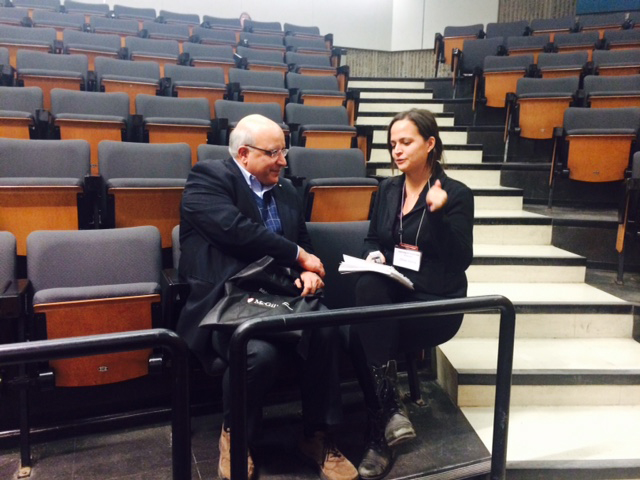
By Chloe Garcia
Principal’s Prize-winning professor Ariel Fenster and Provost Anthony Masi headlined the recent “Learning to Teach day,” hosted by SKILLSETS on Nov. 15. Over 185 graduate students and postdocs experienced some of Dr. Fenster’s strategies to promote student engagement in the classroom including hands-on experiments and amusing stories during the event’s morning plenary. Provost Masi closed the day of teaching workshops with his talk about universities’ expectations for tenure track position applicants, and the changing landscapes of classrooms in the digital age.
Masi tackled a popular question amongst the crowd of graduate students interested in teaching at a research-intensive university such as McGill, namely “What aspects of teaching and learning do you look for in tenure files?”
The Provost said that key pieces to a great application include a multi-dimensional dossier that displays exemplary performances in the classroom, the ability to supervise and mentor students, adaptability to new pedagogies and technologies, and of course, extensive research. “At the moment of hiring, the only real evidence that we have for a person’s potential for obtaining tenure is their research record. So they will have gotten a PhD, done some publications, had a postdoc,” Masi explained in an interview afterwards. “They will have then produced research output. That is usually what gets you noticed.”
Masi dismissed the rumor that tenure positions are running out, referring to McGill’s hiring record. “Right now academic renewal has remained for ten years a hallmark of McGill’s approach to strategic academic planning. We have hired between 75 and 100 new professors every year for the last ten years. Actually, the last 12 years,” he said. “So, we believe that there is still room for growth in the academic profession. We hope to continue at that rate. And not all universities are doing that. And it’s not that there are no jobs, there are jobs, but there are a lot of people chasing after the most lucrative jobs.”
And in order to get those jobs, graduate students need to start early building a memorable portfolio. Referring to the sports analogy “triple threat,” McGill’s Provost recommends that tenure track applicants show excellent teaching and research skills, as well as a sense of collegiality. Universities seek out graduates who can produce research that will attract students and generate resources.
Masi also stresses that excellent teaching skills are an important facet of the application. Referring to current tenure track professors at McGill, he said, “They need more opportunities to figure out how to become good professors.”
McGill graduate students can start honing their teaching skills early, through their departments or the workshops offered throughout the year by Teaching and Learning Services. Not planning on pursuing a tenure track position in academia? Teaching skills, which may include the ability to facilitate others’ learning or to master information communication technologies, appeal to potential future employers outside education institutions as well.
